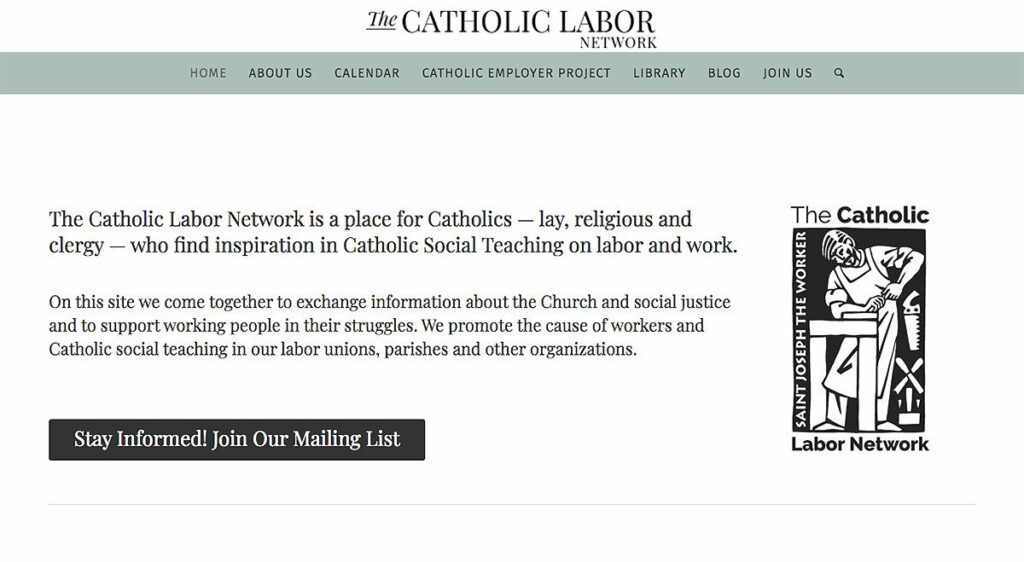Cultivating the vineyard of the Lord includes cultivating the lives of those who toil in the vineyard. God’s vineyard is the entire Earth, and the “workers” in the vineyard are all of God’s people, earning our daily bread as co-creators with God, no matter our craft.
Catholic Social Teaching upholds the dignity of work and the rights of workers. The first social encyclical, “Rerum Novarum,” written by Pope Leo XIII in 1891, grounds our social tradition in a discussion of labor and worker rights.
As work became more industrialized, Pope Leo XIII advocated for just working conditions, the rights of workers to bargain collectively and form unions, and to earn a living wage – all of which our Church still supports.
In “Caritas in Veritate,” Pope Benedict XVI quotes St. John Paul II in “Laborem Exercens”: “In many cases, poverty results from a violation of the dignity of human work, either because work opportunities are limited (through unemployment or underemployment), or ‘because a low value is put on work and the rights that flow from it, especially the right to a just wage and to the personal security of the worker and his or her family'” (No. 63).
To uphold the dignity of work and the rights of workers means to question unjust systems that violate human dignity by not paying a fair wage, withholding wages or preventing workers from their right to organize and bargain collectively for their safety, livelihood and protections on the job.
Thankfully, there are prophets in our midst who cry out in defense of – and solidarity with – workers. Nationally, the Catholic Labor Network works to build Church-labor partnerships to further the work of justice by protecting vulnerable workers and educating the faithful about Church teaching, including on a just and living wage.
In light of the country’s stagnant federal minimum wage, the network is supporting a Nashville Living Wage certification program to honor employers who pay a “more just minimum wage” by choice.
Catholic Labor Network has also supported local Catholic Charities agencies around the country that are exploring partnerships with North America’s Building Trades Unions’ Multi-craft Core Curriculum (MC3) Apprenticeship Readiness Program to channel Catholic Charities clients, low-income Catholic parishioners, and referrals from local St. Vincent de Paul conferences into stable and fiscally solvent careers in the union construction trades.
Music City Construction Careers in Nashville is one such bridge-building program. Apprenticeship graduate Joseph Kenyiawa, who was resettled through Catholic Charities in Nashville from Sudan 20 years ago, is a pillar of the Sudanese Catholic community. Upon graduation, Kenyiawa said that joining the Laborers’ International Union is his “opportunity to leave a firm foundation for (his) family.”
Stand Up Nashville, a grassroots organization supported by the Catholic Campaign for Human Development, also in Nashville, has fought for a community benefits agreement around the new soccer stadium construction project to ensure that local residents benefit from living wage employment opportunities.
Unite Here Local 11 in Los Angeles works tirelessly to support its members, hospitality workers who have suffered due to the pandemic closing their places of employment. Their “Right to Recall” campaign ensures that when businesses do reopen at full capacity, they call back furloughed workers at their former wages and benefits. Similar efforts are underway in cities across the country.
“Economic security is an essential foundation for strong families,” explained Father Ty Hullinger, pastor of St. Anthony of Padua Catholic Church, who joined other Baltimore Catholics in a successful campaign for Right to Recall in his city. “It is a matter of human dignity,” he said.
These are signs of human dignity being upheld, of people being placed over profit. When we understand ourselves as all workers in God’s vineyard (Mt 20:1-14), we cannot help but join the fight for our fellow workers who are being mistreated. By doing so, we heed Pope Francis’ advice in “Evangelii Gaudium” to say no “to an economy of exclusion and inequality” and yes to an economy that restores human dignity (No. 53).
Aimee Shelide Mayer is a social justice and spiritual formation consultant to nonprofits, churches and schools. In this role, she serves as the local representative of the national Catholic Labor Network in Nashville, Tennessee. She holds a master’s degree in theology.

